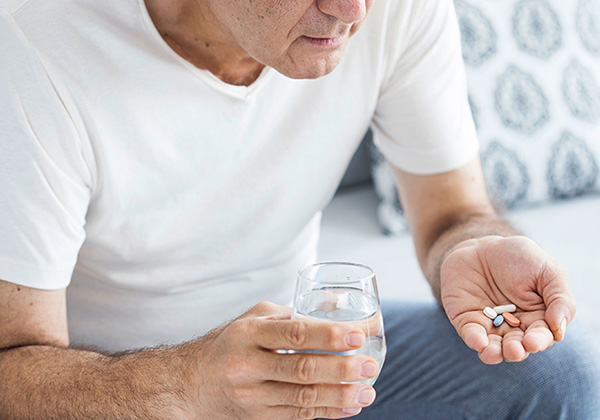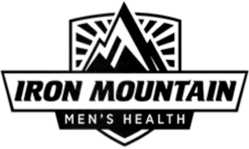Low Testosterone Symptoms
Testosterone (or T) is the male sex hormone, and it’s responsible for regulating many different aspects of a man’s body such as muscle mass, red blood cell production, fertility and body fat distribution. It’s also important for the growth of the penis and testes, with the testes being the main area where testosterone is made. However, some men age and find themselves facing low levels of testosterone, which can cause unwanted side effects such as weight gain and fatigue. Other causes of low testosterone levels can be a disease in the pituitary gland and hormone therapy related to prostate cancer. There are several common symptoms of low testosterone that we will be going over today, starting with a more emotional change: depression.
Depression
As well as helping out your body in a physical sense, testosterone also affects the regulation of your emotions. Low T levels can, unfortunately, lead to depression, as well as irritability, lowered motivation and issues with self-confidence.
This issue isn’t just for men either, as women with low levels of testosterone have been found to experience symptoms of depression as well – it is thought that this is related to menopause, as it has been observed in both post-menopausal women and those who are approaching the menopause.
Treating your low testosterone levels should alleviate the depression, such as with testosterone replacement therapy (or TRT). You could also pursue traditional methods of treating depression, such as therapy and medications, as recommended by a doctor.

Erectile dysfunction
Erectile dysfunction (or ED) is a common problem within the world of men’s health, often brought about by stress or physical causes such as medical conditions like type 2 diabetes and heart disease. It can also be caused by testosterone deficiency, meaning that men with lower testosterone may find it difficult to achieve or maintain an erection.
There are multiple treatment options available to those struggling with low total testosterone who want to return to normal testosterone levels. These testosterone treatments will be likely to reduce this symptom as well, unless it is caused by a different problem such as the medical conditions mentioned above.
Fatigue decreased energy levels
Older men may commonly experience fatigue as they age, but it can also be a sign of reduced testosterone production in the testicles. Chronic fatigue, or fatigue that isn’t affected by rest, is one of the main symptoms of low T. Testosterone affects the generation of energy in the body, so testosterone levels outside of a normal range can cause this chronic fatigue.
There are several natural methods of fighting the chronic fatigue associated with low T, such as ensuring that you get plenty of regular sleep every night. Eating a diet with low amounts of saturated fat but higher amounts of vegetables and fruits can reduce fatigue, as well as battling high cholesterol and high blood pressure – other health conditions that can lead to low testosterone.
Moderating your alcohol intake can tackle the initial problem of low T as well, since ingesting high amounts of alcohol can lead to liver dysfunction, which is one of the causes of low T.
Loss of libido (sex drive)
The reduction in a man’s sex drive due to low testosterone levels can go hand-in-hand with the symptom of erectile dysfunction. This is due to ED often causing issues and anxieties around sexual activities and between sexual partners.
Low sex drive can be a very difficult symptom to deal with. Improving your lifestyle by engaging in stress management techniques can work towards reducing the symptom and improving your sexual desire, but treating the underlying issue of low testosterone is the prime way to move forwards.
Going to a specialist in urology to obtain a diagnosis for testosterone deficiency may involve blood tests as well as other exams and questions about your medical history, but it’s an important step towards reducing the symptoms of low T. It could lead to you accessing TRT and returning to normal testosterone levels.
Memory loss and concentration challenges
Some men dealing with low testosterone find themselves struggling with both memory loss and lack of concentration. This can make daily tasks become frustrating and could lead to issues if both problems are not quickly addressed. Memory loss is often connected with people finding it difficult to communicate with others, becoming angry quickly and causing depression.
Healthcare can become difficult for people dealing with memory loss due to low T, since forgetting to take medication or eat food at the right times can lead to increased risk of health problems and malnutrition. Equally, lack of concentration could make working through the day much more stressful than it usually would be.
For slight memory loss, trying out puzzles and learning new skills or languages can be beneficial. But more severe memory loss related to low T and challenges with concentration will be treated by increasing testosterone, usually through TRT or other means.
Weight gain
There is a clear link between obesity and low T, although it doesn’t just go one way. Low testosterone does lead to an increased risk of weight gain, since testosterone is involved with building muscle in the body and motivating men to improve their physical fitness. Without a normal range of testosterone, that motivation and interest in maintaining weight or engaging in healthy weight loss rapidly disappears.
However, obesity can also cause low testosterone. Weight gain leads to higher levels of estrogen, the female sex hormone, in the male body. While all men have small amounts of estrogen in their bodies, increased levels of the hormone can interrupt testosterone production by confusing the endocrine system. This cycle can be difficult to break, but weight loss is one strong way to boost testosterone, especially when low testosterone has been caused by obesity.
Infertility
Low testosterone can lead to the testicular problem of low sperm production. In turn, this can cause fertility issues for men. Compounded with a lack of sexual function due to lower libido and potential ED, this can make conceiving a child with a partner very difficult for men dealing with low testosterone.
However, some treatment options such as TRT can also cause infertility. It reduces the amount of follicle-stimulating hormone (or FSH) in the body, meaning that sperm production is also reduced. This is often reversible, but a small number of men may find themselves facing a nonreversible reduction to their ability to conceive a child. Couples currently trying to conceive would be advised to look at other options for treatment.
Decrease in bone mass
Testosterone affects the production and strengthening of bone, so low testosterone can cause a decrease in bone density or mass. Men who experience hypogonadism, or the prolonged and excessive form of low testosterone, could also find themselves experiencing osteoporosis, where bones are fragile and often fracture. Testosterone treatment can treat and prevent osteoporosis connected with low testosterone.
Loss of muscle mass
As well as causing weight gain, lower testosterone levels can cause loss of muscle mass for similar reasons. When the motivation to improve physical fitness and build muscle is gone, men may find it difficult to continue to exercise regularly and build muscle.
Luckily, this symptom can be reduced alongside weight gain by working towards losing weight, among other treatments.
Reduction in beard and body hair growth
Since testosterone controls hair growth, studies into endocrinology have found that not having enough of the hormone can lead to hair loss. Commonly affected areas include around the genitals, under the arms, on the face and on the chest.
Growth of breast tissue
For adult men dealing with low testosterone, one symptom could be the growth of breast tissue on the chest, also known as gynecomastia. This can be a distressing symptom caused by the increase in estrogen in the body when testosterone levels decline.
Gynecomastia can slightly increase a man’s chance of developing breast cancer. While unwanted breast tissue growth can be reduced naturally through exercise and losing weight, as well as treatments to increase testosterone, it’s important to stay alert for any unusual lumps in the chest area which could be related to breast cancer.
